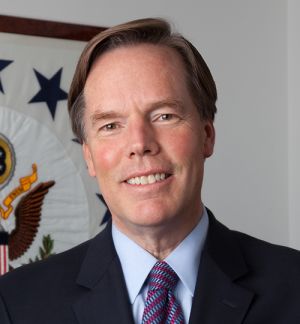WHEN PRESIDENT Obama declared that we should try diplomacy with Iran before war, it was fascinating, and a little disconcerting, to watch his army of critics strike back. In a brash bellowing for war that amounted to an ultimatum to the White House, Israeli Prime Minister Benjamin Netanyahu insisted that bombing Iran was still the answer.
Presidential hopefuls Rick Santorum and Mitt Romney, as well as other Republicans, declared the president to be, in effect, feckless, reckless, naive, and misguided in planning to talk to Iranian mullahs.
The irony is that Obama's Iran policy is remarkably close to that of the Bush administration and the Romney campaign. To prove it, Obama delivered the toughest message of his presidency to the Iranian leadership. He will stop Iran from acquiring nuclear weapons. He will not support containment, as it might lead others in the region to go nuclear. He has Israel's back. And he is not bluffing.
But Obama was also uncharacteristically passionate in warning that there has been too much talk of war and that diplomacy is still our best option. The message was clear: While force is on the table to counter a menacing Iran, we should consider every angle and probe for every opportunity for peace before we act.
In fact, the Obama team expects to be across the negotiating table from Iran by next month. It won't be easy. Iran's hard-line negotiators will likely stiff their American counterparts in the first round of talks. Obama must then decide whether to continue negotiations in search of an eventual agreement. Considering the stakes, it would be foolish to walk away too soon. Obama will hold a strong hand in the negotiations, with tough EU oil and US banking sanctions about to kick in. And we have little to lose as we can always consider force if talks fail.
The most confounding aspect of our public debate is that we are considering war with a dangerous adversary about whom we know very little. No senior American official has even met Iran's supreme leader, Ali Khamenei. There has been virtually no contact between the two governments in 30 years. As undersecretary of state working on Iran policy during President Bush's second term, I and my colleagues were not permitted to talk to Iranian officials. It went against an elementary lesson I learned as a diplomat - no matter how distasteful, we must talk to governments we don't like if we want to outsmart them and avoid war. For that very reason, an earlier and much wiser Israeli leader, Yitzhak Rabin, warned memorably, "You don't make peace with friends. You make it with very unsavory enemies."
That is why the president is right to put diplomacy first. It is the only way to know for sure if we might halt Iran's nuclear weapons drive short of war. Can Iran accept a civil nuclear future but forswear nuclear weapons and live under strict IAEA inspections? Is there a possibility that crippling sanctions and the help of Europe, Russia, and China might yet convince Iran to negotiate a deal in our favor? We will never know unless we talk to the Iranians before we fight them.
Obama's critics would do well to recall two hard facts. First, diplomacy takes time. If Iran doesn't capitulate within a few weeks, predictable voices will call for war instead. We have time to negotiate before Iran gets perilously close to a nuclear weapons capability. Obama should take that time to figure out if Iran is serious. That is how diplomacy works on an issue as complicated and potentially deadly as this.
Finally, we should be wary of partisan bickering on the most important international issue facing our country. Genuine patriots like John McCain are trying to protect us by taking a hard line against a brutal regime in Iran. Americans who love Israel are right to consider Iran as a possible existential threat. But, in many ways, this may be Obama's finest moment as president. On this difficult problem, and with war in the balance, his cool and careful conviction that we should reflect deeply before we strike, and give diplomacy a chance, is the right one for our country.
Burns, Nicholas. “Obama delivers a clear message on Iran.” The Boston Globe, March 15, 2012





